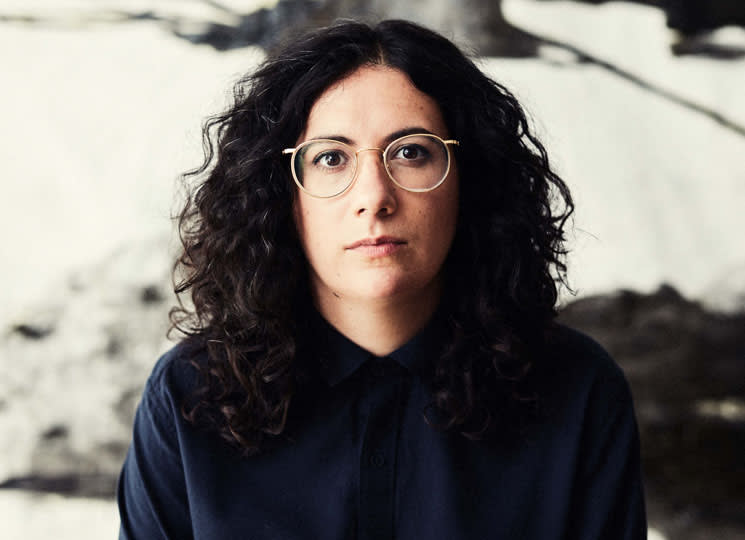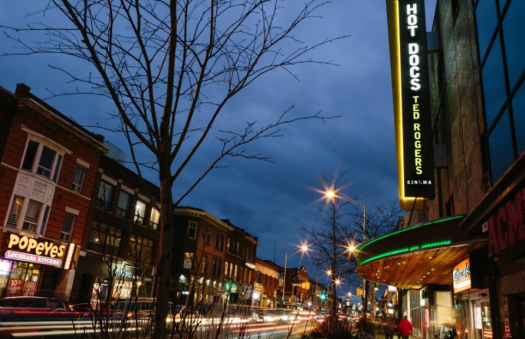Over 43 million people tuned in to the 86th Academy Awards on March 2, 2014, but Alexandra Stréliski's viewing experience was surely unique.
The Montreal-based composer's song, "Prelude," from her 2010 debut Pianoscope, had been featured in Jean-Marc Vallée's film Dallas Buyers Club, which had been nominated for six awards. She tuned in to support the filmmaker who had plucked her song seemingly out of nowhere.
"I don't know how he discovered the music, I never asked," she tells Exclaim!
When "Prelude" appeared as background music during one of the many nominee montages, Stréliski was overjoyed. Then, the film won its first of three Oscars for the night, and that's when Stréliski's life changed forever.
"They started playing my song with the orchestra and everything," recalls Stréliski. "There was a flute playing the melody and I thought, 'Wait, there's no flute in my song!' And then my phone just started to ring like crazy because all the people who were listening to Pianoscope, they identified the song."
It had already been three years since the composer had quietly self-released Pianoscope, but the album was just about to take off. After the resulting media attention, Stréliski continued working at her full-time job as a composer for the ad industry while Vallée continued using songs from Pianoscope in his works — next, 2015's Demolition, then in a trailer for HBO series Big Little Lies.
Finally, as interest in Stréliski's compositions reached a fever pitch, she decided to quit her job and pursue her own work full-time.
"It was really time for me to start doing something else," says Stréliski, "I had an episode of depression — well, burnout, actually, but it's close — because I overworked and I wasn't doing the right thing anymore. For me, I learned that when you have that kind of episode in your life, you have to rethink things a bit. So that's what I did."
That led her to sophomore effort Inscape, a series of delicate soundscapes nimbly delivered by nothing more than Stréliski and a grand piano. Though it's a solo piano record like Pianoscope, Inscape turns its gaze inward for melancholic reflections, sombre and vulnerable yet reflective. It elicits a surprising amount of emotion, given the restrictive instrumental palate.
"When you score a film, you put yourself in the emotional shoes of that character, and it just passes through you, but when I do it for myself, I'm just basing it on my own life, on my own emotion. So I think mostly what changed is that I grew up," she says with a laugh. "What you hear is what you get. It's really about emotions, and what changed is me."
With nothing more than Stréliski's hands on a piano, the compositions of Inscape evoke strong moods, from delicate wistfulness to a sprightly jaunt. It's easy to project one's own imagery atop her soundscapes — no wonder she's earned such a strong, visual-focused fan in Vallée.
"I've just observed it through the years, that people tell me stories, very personal stories, like 'Oh yeah, I've been listening to your record during my divorce and it helped me through it,' stuff like that. It's very a profound thing that we share as humans. I think it's beautiful that music can bring us together."
Stréliski's desire to bring people together through the power of classical music extends beyond mere sound — she also seeks to break down the barriers that prohibit people from accessing classical music, whether self-imposed or through the genre's staid conventions.
"I think it got very elitist," she says of classical music. "And I think also, maybe it's a bit too academic, a bit too square. We need more freedom now, in music. So there's a whole accessibility part. Accessibility in both ways, musically and the way that the music is consumed."
Aiming to break down the ivory tower that isolates classical music from the rest of the industry, Stréliski joins her Canadian contemporaries Chilly Gonzales and Jean-Michel Blais as solo piano composers looking to bring the form to the rest of the world. Signed to Montreal indie label Secret City and performing in regular-sized venues, Stréliski aims to tug at the heartstrings of the widest range of people possible.
Part of Stréliski's success can be attributed to her willingness to defy classical conventions from the get-go, which she did by putting Pianoscope on Bandcamp and allowing buyers to choose their own price. It was this accessibility, she believes, that led Vallée to her music though, again, she doesn't know for certain.
Now fully immersed in the world of freelance music composition, Stréliski has no concrete plan for her next moves. She recently collaborated with Vallée on original compositions for the first time with the director's Amy Adams-starring HBO series Sharp Objects, and hopes to tour Inscape around the world and potentially work with a choir on new compositions.
But there's no rush, she says — Pianoscope's profile rose steadily in the eight years since its initial release, and there's no reason to believe that Inscape would be any different. "I was amazed by it too, I was like, 'Man, it's been eight years, I'm still selling records, scores and music sheets and the album is living on its own,'" she says. "I think that has to do with the classical colour to it, because it's really timeless music."
Inscape is out now on Secret City Records.
The Montreal-based composer's song, "Prelude," from her 2010 debut Pianoscope, had been featured in Jean-Marc Vallée's film Dallas Buyers Club, which had been nominated for six awards. She tuned in to support the filmmaker who had plucked her song seemingly out of nowhere.
"I don't know how he discovered the music, I never asked," she tells Exclaim!
When "Prelude" appeared as background music during one of the many nominee montages, Stréliski was overjoyed. Then, the film won its first of three Oscars for the night, and that's when Stréliski's life changed forever.
"They started playing my song with the orchestra and everything," recalls Stréliski. "There was a flute playing the melody and I thought, 'Wait, there's no flute in my song!' And then my phone just started to ring like crazy because all the people who were listening to Pianoscope, they identified the song."
It had already been three years since the composer had quietly self-released Pianoscope, but the album was just about to take off. After the resulting media attention, Stréliski continued working at her full-time job as a composer for the ad industry while Vallée continued using songs from Pianoscope in his works — next, 2015's Demolition, then in a trailer for HBO series Big Little Lies.
Finally, as interest in Stréliski's compositions reached a fever pitch, she decided to quit her job and pursue her own work full-time.
"It was really time for me to start doing something else," says Stréliski, "I had an episode of depression — well, burnout, actually, but it's close — because I overworked and I wasn't doing the right thing anymore. For me, I learned that when you have that kind of episode in your life, you have to rethink things a bit. So that's what I did."
That led her to sophomore effort Inscape, a series of delicate soundscapes nimbly delivered by nothing more than Stréliski and a grand piano. Though it's a solo piano record like Pianoscope, Inscape turns its gaze inward for melancholic reflections, sombre and vulnerable yet reflective. It elicits a surprising amount of emotion, given the restrictive instrumental palate.
"When you score a film, you put yourself in the emotional shoes of that character, and it just passes through you, but when I do it for myself, I'm just basing it on my own life, on my own emotion. So I think mostly what changed is that I grew up," she says with a laugh. "What you hear is what you get. It's really about emotions, and what changed is me."
With nothing more than Stréliski's hands on a piano, the compositions of Inscape evoke strong moods, from delicate wistfulness to a sprightly jaunt. It's easy to project one's own imagery atop her soundscapes — no wonder she's earned such a strong, visual-focused fan in Vallée.
"I've just observed it through the years, that people tell me stories, very personal stories, like 'Oh yeah, I've been listening to your record during my divorce and it helped me through it,' stuff like that. It's very a profound thing that we share as humans. I think it's beautiful that music can bring us together."
Stréliski's desire to bring people together through the power of classical music extends beyond mere sound — she also seeks to break down the barriers that prohibit people from accessing classical music, whether self-imposed or through the genre's staid conventions.
"I think it got very elitist," she says of classical music. "And I think also, maybe it's a bit too academic, a bit too square. We need more freedom now, in music. So there's a whole accessibility part. Accessibility in both ways, musically and the way that the music is consumed."
Aiming to break down the ivory tower that isolates classical music from the rest of the industry, Stréliski joins her Canadian contemporaries Chilly Gonzales and Jean-Michel Blais as solo piano composers looking to bring the form to the rest of the world. Signed to Montreal indie label Secret City and performing in regular-sized venues, Stréliski aims to tug at the heartstrings of the widest range of people possible.
Part of Stréliski's success can be attributed to her willingness to defy classical conventions from the get-go, which she did by putting Pianoscope on Bandcamp and allowing buyers to choose their own price. It was this accessibility, she believes, that led Vallée to her music though, again, she doesn't know for certain.
Now fully immersed in the world of freelance music composition, Stréliski has no concrete plan for her next moves. She recently collaborated with Vallée on original compositions for the first time with the director's Amy Adams-starring HBO series Sharp Objects, and hopes to tour Inscape around the world and potentially work with a choir on new compositions.
But there's no rush, she says — Pianoscope's profile rose steadily in the eight years since its initial release, and there's no reason to believe that Inscape would be any different. "I was amazed by it too, I was like, 'Man, it's been eight years, I'm still selling records, scores and music sheets and the album is living on its own,'" she says. "I think that has to do with the classical colour to it, because it's really timeless music."
Inscape is out now on Secret City Records.




